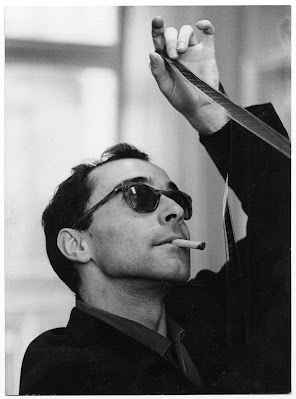Jean-Luc Godard, one of the most important and influential filmmakers who dramatically shifted the potential of cinema by challenging the conventions of the art form, has died at the age of ninety-one. With the release of his debut feature, "Breathless" in 1960, he helped to establish what would be known as the French New Wave movement which rejected traditional filmmaking methods to explore experimentation with narrative, editing and visual style, which effectively reinvigorated motion pictures. He was also one who strongly championed the idea of the auteur theory which stated that the director was the clear 'author' of a film despite there being many people involved in the making of the project.
Godard was born into wealth and comfort with his father, Paul was a Swiss doctor and his mother, Odile was the daughter of Julien Monod, a founder of the Banque Paribas. While he did not attend films regularly when he was young, Godard became intrigued with cinema by reading about it in the magazine, La Revue du cinéma. But his interest intensified when he joined several ciné-clubs in Paris, groups dedicated to film screenings and discussions. This lead to Godard to explore film criticism and founded a short-lived magazine, Gazette du cinéma with Jacques Rivette and Maurice Schérer (who would later become better known as filmmaker, Éric Rohmer). He would go on to write for the just established film journal, Cahiers du Cinéma in 1951.
During this time, Godard got his hands on a camera and began to make short films, becoming friendly with other aspiring filmmakers, Alain Resnais, Claude Chabrol, Jacques Demy, Agnès Varda and François Truffaut. Now determined to make his first feature film, Godard went to the 1959 Cannes Film Festival where he got financing from producer Georges de Beauregard and asked Truffaut if he could use an idea they had come-up together about a car thief.
With his follow-up film, "Une femme est une femme (A Woman Is a Woman)" in 1961 (which would star his future wife, Anna Karina), this began a period, lasting about eight years, where Godard would go on to make movies that reflected his love of Hollywood and film history yet told through his particular vision of cinema. This included "Bande à part (Band of Outsiders)", "Alphaville", "Pierrot le Fou", "Masculin Féminin", "Deux ou trois choses que je sais d'elle (Two or Three Things I Know About Her)", "La Chinoise", "Week-end" and the other film Godard is probably best known for, "Le Mépris (Contempt)", from 1963 that starred Brigitte Bardot, Michel Piccoli and Jack Palance.
By 1968, Godard seemed to have become disillusioned by his fame and the history of conventional cinema, referring to most of it as "bourgeois", deciding to largely move away from mainstream filmmaking and began to shift his focus by taking more of an active political stance in his life and films. His work during this time involved protesting against wars and social injustice, avant-garde documentaries and "Tout Va Bien", a political drama in 1972 which starred Yves Montand and Jane Fonda.
Godard returned to more traditional filmmaking in 1980 with "Sauve qui peut (la vie) (Every Man for Himself)" with Isabelle Huppert and Nathalie Baye. He continued to work regularly throughout the rest of the 1980's and '90's, which included experimental films inspired by Bizet's opera ("Prénom Carmen (First Name: Carmen)"); a modern re-telling of the story of the virgin birth ("Je vous salue, Marie (Hail Mary)"); and an adaptation of a William Shakespeare play ("King Lear"). By the turn of the century, Godard's output had slowed down, making five feature films and essentially abandoning a clear narrative structure, focusing instead on a fragmented montage of images and even experimenting with 3D with "Adieu au Langage (Goodbye to Language)" in 2014. Godard's final film, "Le Livre d'image (The Image Book)" was released in 2018 and was an avant-garde essay about the modern Arabic world.
While he did suffer from some health issues, Godard was not seriously ill yet was simply tired of living. He decided to end his life on September 13th with the assistance of voluntary euthanasia which is legal in Switzerland where the director has lived off and on since childhood. Godard was married twice; to Anna Karina, the Danish actress appeared in eight films with Godard, who were married for five years until 1965. Karina passed away in 2019. He then married French actress, Anne Wiazemsky in 1967, who performed in his films, "La Chinoise" and "Week-end", with the couple ending their marriage in 1979. Wiazemsky died of breast cancer in 2017.
What I think has made Jean-Luc Godard continue to be such a remarkably enduring yet certainly divisive figure in cinema was his strong passion for artistic freedom, to creatively challenge himself with bold, unorthodox work that in turn would entice, frustrate and surprise viewers, opening them up to explore the endless possibilities of meaning in his films.



No comments:
Post a Comment